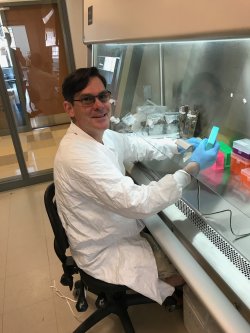
View Profile Page

Carlos Molina
Professor, Biology, College of Science and Mathematics
- Office:
- Center for Environmental & Life Sciences 400
- Email:
- molinac@montclair.edu
- Phone:
- 973-655-3302
- Degrees:
- BS, University of Puerto Rico, Rio Piedras
- MS, Purdue University
- PhD, Purdue University
- vCard:
- Download vCard
Profile
Dr. Carlos A. Molina is a Professor of Molecular Biology at the College of Sciences and Mathematics of Montclair State University. From 1994 to 2006 he was an assistant professor at the Department of Obstetrics, Gynecology and Women’s Health at Rutgers Medical School in Newark, NJ.
Dr. Molina received his B.S. in Biology from the University of Puerto Rico, M.S. and Ph.D. in Biochemistry for Purdue University and postdoctoral training in molecular and cell biology at the University of Louis Pasteur in Strasbourg, France.
Using zebrafish as a model organism, Dr. Molina has focused his research in two areas, cancer and the female reproductive system. In the area of cancer research he seeks to understand the mechanisms involved in eliminating and misplacing a protein with tumor suppression activity in skin cancer cells. This data set the stage to test for pharmacological agents specifically targeted to inhibit the degradation and abnormal localization of this protein.
In the area of reproductive biology he is developing ovarian-specific transgenic zebrafish to dissect the molecular mechanisms of ovulation. These studies may lead to the development of new technologies in the field of agricultural livestock, where higher ovulation rates are desired. Further research in this area could also lead to the development of novel reproductive technologies.
Dr. Molina was the recipient of several honors and grants from the American Association of Cancer Research, National Health Institute, National Science Foundation. He has been a member of the National Institutes of Health National Heart, Lung and Blood Institute and Department of Defense Ovarian and Prostate Cancer Study Sections.
Office: Center for Environmental and Life Sciences (CELS) 400
Specialization
Cancer Research
Biology of Reproduction
Resume/CV
Office Hours
Fall
- Tuesday
- 3:30 pm - 5:00 pm
- Dr. Carlos Molina's Personal Meeting Room https://montclair.zoom.us/j/8353259292
- Thursday
- 3:30 pm - 5:00 pm
- Dr. Carlos Molina's Personal Meeting Room https://montclair.zoom.us/j/8353259292
Spring
- Tuesday
- 3:30 pm - 5:00 pm
- Dr. Carlos Molina's Personal Meeting Room https://montclair.zoom.us/j/8353259292
- Thursday
- 3:30 pm - 5:00 pm
- Dr. Carlos Molina's Personal Meeting Room https://montclair.zoom.us/j/8353259292
Links
Montclair State University does not endorse the views or opinions expressed in a faculty member's webpage or website. Consistent with the principles of academic freedom, the content provided is that of the author and does not express the opinions or views of Montclair State University.
Documents
Research Projects
Cancer and Reproductive Biology
Dr. Molina has focused his research in two areas, cancer and biology of reproduction. In the area of cancer research he seeks to understand the mechanisms involved in eliminating and misplacing a protein with tumor suppression activity using a zebrafish model for melanoma as a paradigm for cancer. This data set the stage to test for pharmacological agents specifically targeted to inhibit the degradation and abnormal localization of this protein. Restoring the function of a misplaced tumor suppressor protein maybe an important anticancer therapy opportunity.
In the area of reproductive biology he is developing an ovarian-specific transgenic zebrafish to dissect the molecular mechanisms of ovulation. These studies may lead to the development of new technologies in the field of agricultural livestock, where higher ovulation rates are desired. Further research in this area could also lead to the development of novel reproductive technologies.